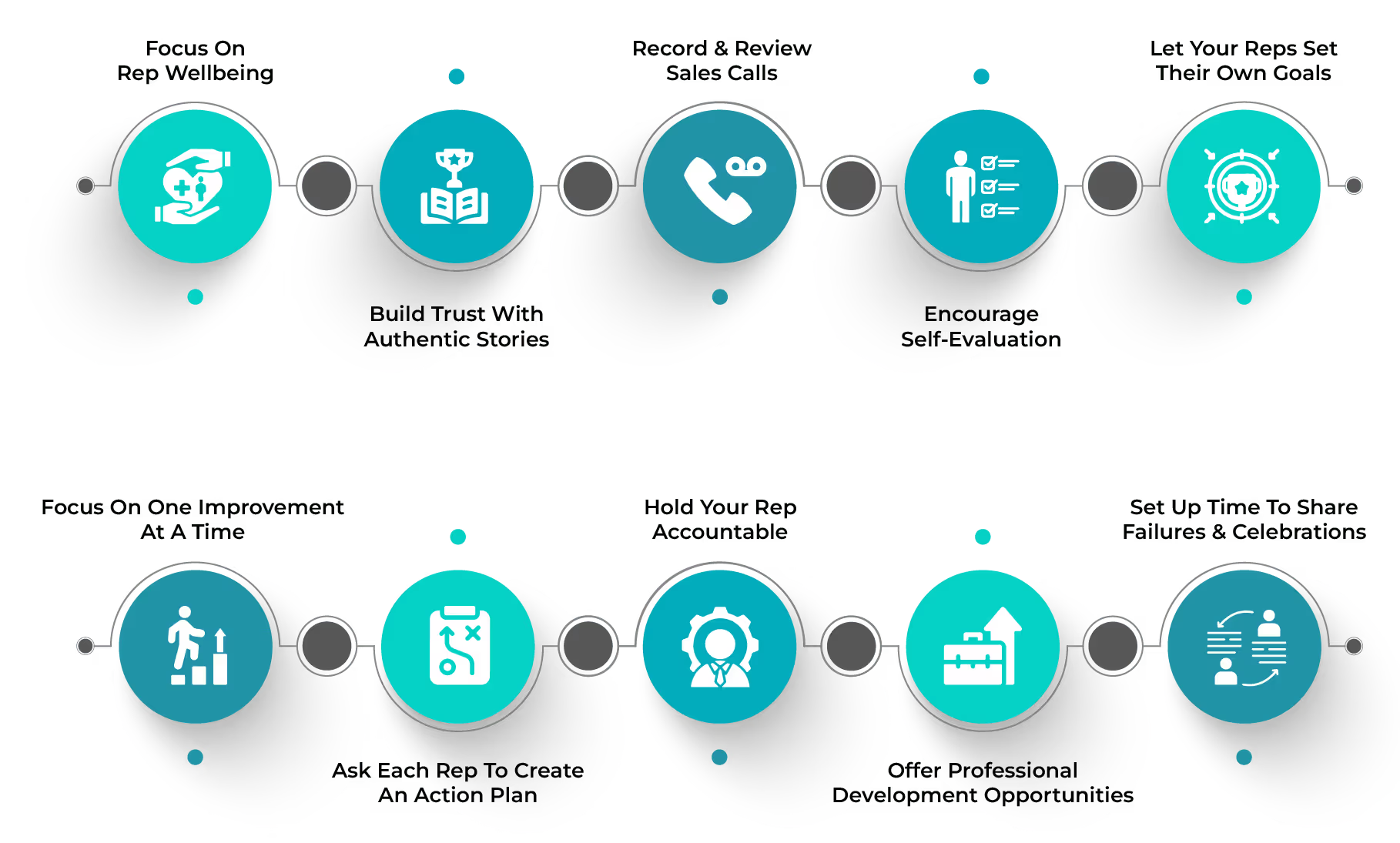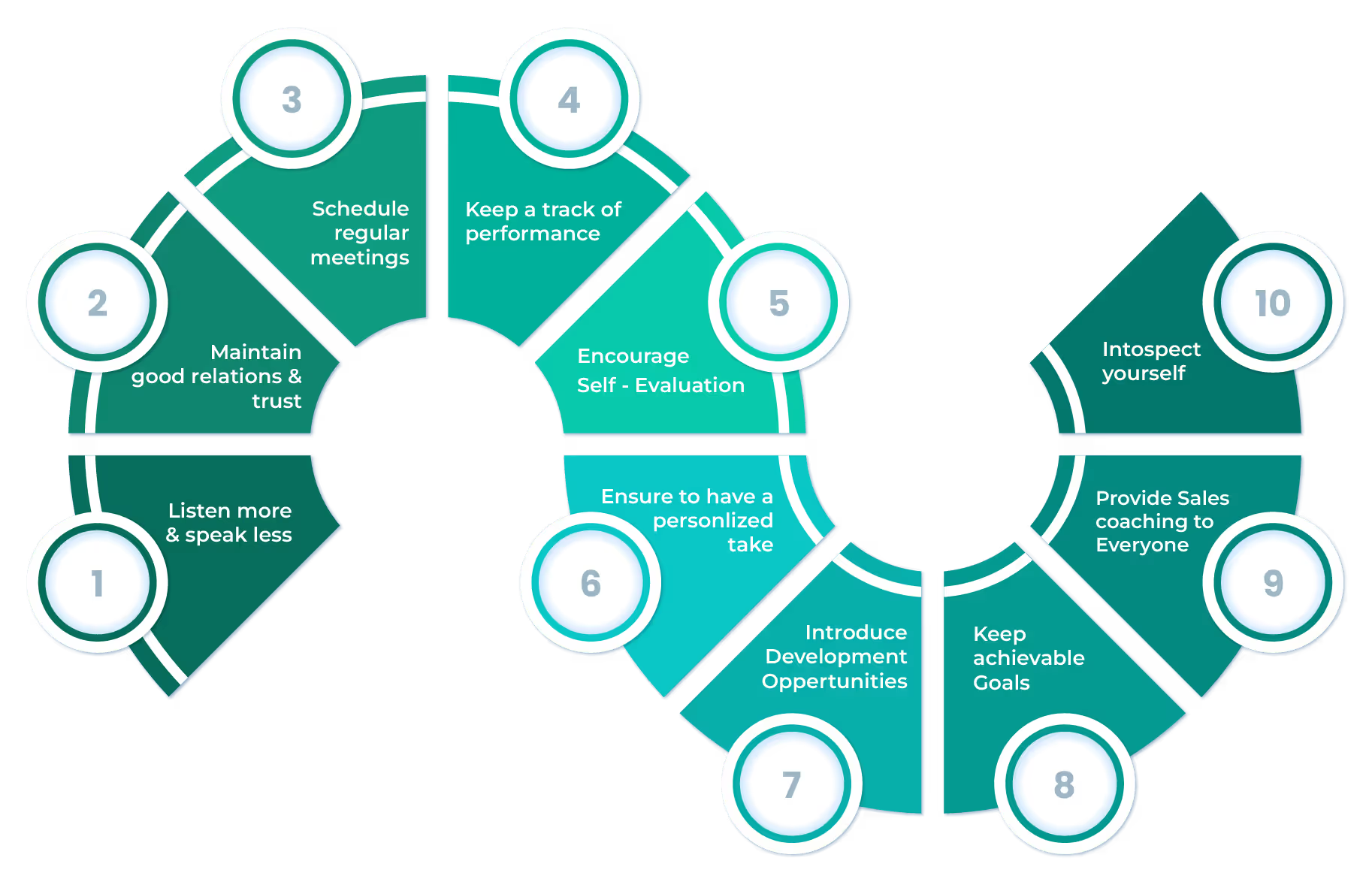
Blog
Achieve Sales Excellence with Professional Sales Coaching
April 12, 2023


Key Insights
Ever wondered what makes a top-notch sales team?
It's not just about getting the best reps out there on board; it's about keeping them on their A-game, constantly evolving and pushing the envelope.
In this blog, we’ll go beyond the standard sales onboarding process and into the world of sales coaching, where the aim is to turn good sales reps into great ones, and great ones into absolute rockstars.
What is sales coaching?
Imagine this:
A one-on-one session between a sales coach and a sales rep, diving deep into the rep's performance, celebrating strengths, and zeroing in on areas ripe for improvement.
That’s exactly what sales coaching is!
It's less of a lecture and more of a discovery journey, where the rep does most of the talking, and the coach tunes in, offering nuggets of wisdom to help the rep shine.
This isn't a one-off; it's a series of sessions designed to keep the sales techniques fresh and the competitive edge razor-sharp.
Sales Coaching Vs. Sales Training
Let’s make this easy! Imagine sales training as the initial boot camp for your sales team – it's where they learn and master the basics. Now, think of sales coaching as the personalized fitness regime that follows.
Sales coaching is all about ongoing development, tailored to each salesperson's needs, helping them refine their skills and strategies over time.
Why Every Sales Team Needs Sales Coaching
Think of your sales team like a sports team. Just like how every athlete needs a dedicated coach to reach their full potential, every salesperson benefits from personalized coaching to unlock their sales prowess.
It’s not just about hitting numbers, it’s about sustainable growth and resilience in the ever-changing market.
Who Needs Sales Coaching?
The short answer? Everyone. From your newest recruit to your seasoned sales veterans, each member of your team has unique strengths to harness and areas to develop.
Tailored coaching ensures that everyone continues to grow, no matter where they are in their career journey.
Sales Coaching Impact
Sales coaching is the tried and tested secret to not just meeting but smashing sales targets! Fine-tuning skills, boosting confidence, and creating a culture of continuous improvement goes a long way.
Be prepared to see- more engaged reps, better customer relationships, and, ultimately, a healthier bottom line.

How do you Coach and Develop a Sales Team?
Developing a sales team requires patience, care, and a bit of science. Start with understanding each rep’s unique needs and motivations.
Use regular one-on-ones to build trust and provide personalized feedback. Encourage goal-setting and self-reflection. And always, always promote a culture of continuous learning and resilience.
Want us to make this easier? Here’s a quick checklist we made so you can build the team of your dreams!
Understand Each Rep's Unique Needs
- Individual Meetings: Conduct regular one-on-one meetings to understand personal and professional goals.
- Skill Assessment: Evaluate strengths and areas for improvement for tailored coaching.
- Motivation Identification: Identify what motivates each rep to customize incentives and support.
Build Trust and Open Communication
- Feedback Culture: Foster an environment where giving and receiving honest feedback is encouraged.
- Active Listening: Practice active listening during meetings to show understanding and support.
- Transparency: Maintain transparency about team goals, changes, and expectations.
Encourage Goal Setting and Self-Reflection
- SMART Goals: Help reps set Specific, Measurable, Achievable, Relevant, and Time-bound goals.
- Reflective Practice: Encourage regular self-reflection on their performance and learning.
- Personal Development Plans: Assist in creating personal development plans that align with career aspirations.
Promote Continuous Learning and Improvement
- Learning Resources: Provide access to sales training materials, courses, and seminars.
- Skill Development: Focus on developing both sales techniques and soft skills (e.g., communication, resilience).
- Peer Learning: Encourage sharing of best practices and learning experiences among team members.
Support and Recognize Effort and Success
- Celebrate Successes: Recognize and celebrate individual and team achievements regularly.
- Constructive Feedback: Offer constructive feedback in a supportive manner to encourage growth.
- Resilience Building: Support reps in viewing challenges as opportunities for growth and learning.
Don’t keep coming back to this article. Download the sales coaching checklist here! Make a copy of the document to use it
Adapting Sales Coaching Techniques for Remote Teams
There is no doubt that the COVID pandemic changed the rules of the game. A crucial change was shifting to remove work models.
Coaches need to adapt as well! Remote coaching has its unique challenges but also offers incredible opportunities.
Use technology to your advantage – think video calls for face-to-face interactions and cloud-based tools for sharing success stories and feedback. Emphasize communication and availability.
And don’t forget the power of virtual team-building activities to keep morale high! A quick game or a friendly competition goes a long way.
Top Sales Coaching Techniques
Ah, the art of sales coaching! What most coaches fail to understand is that it’s not just about pushing your reps to hit those numbers, it's about nurturing them.
Imagine a world where your sales reps aren't just working for the weekend but are genuinely excited about that Monday morning. That's the kind of motivation effective sales coaching can create.
Now, you might be wondering, "How do I do this?”
Well, it starts with understanding that each rep is a unique puzzle piece, fitting into the bigger picture of your team's success.
Recognize their individual strengths, motivations, and, yes, even their fears. So, as we dive into these top sales coaching techniques, remember: this isn't just about improving sales. It's about creating a team that's resilient, motivated, and, above all, happy.
- Customized Feedback: Tailor your advice to each rep's specific needs.
- Role-playing: Practice makes perfect, especially in handling tough customer scenarios.
- Goal Setting: Help reps set and achieve personal milestones.
- Performance Analysis: Use data to pinpoint areas for improvement.
- One-on-One Meetings: Regular, personal check-ins to address individual challenges and growth.
How to Measure Sales Coaching Effectiveness
Measuring coaching effectiveness is crucial. Look beyond just the sales figures. Consider metrics like engagement levels, goal attainment rates, and feedback from reps. Surveys and self-assessments can also provide insights into how well the coaching is resonating. Remember, the goal is continuous improvement, for both the coach and the reps.
What Does A Good Sales Coach Do?

A great sales coach is a mentor, a guide, and sometimes a friend. They know when to push and when to listen, helping each rep find their path to success. They focus on creating a supportive environment that celebrates wins and learns from losses.
But what can coaches do differently? What are those key points that are simple yet easy to miss? Don' t worry, we jotted them down for you!
- Focus On Rep Wellbeing: Happy reps sell more. Period.
- Build Trust With Authentic Stories: Share your own sales battles and victories. Let them see the human behind the coach.
- Record And Review Sales Calls: It’s the game tape for sales. Review it together, celebrate the wins, and learn from the losses.
- Encourage Self-Evaluation: Help reps reflect on their own performance. It’s powerful.
- Let Your Reps Set Their Own Goals: Ownership is motivating.
- Focus On One Improvement At A Time: Don’t overwhelm. Improve step by step.
- Ask Each Rep To Create An Action Plan: Plans make goals achievable.
- Hold Your Rep Accountable: Friendly accountability ensures progress.
- Offer Professional Development Opportunities: Growth isn’t just about sales numbers.
- Set Up Time To Share Failures — And Celebrations: Both are invaluable for learning and team spirit.
Benefits of sales coaching
So, why invest time and resources into sales coaching?
Well, 77% of companies already report improved sales performance as a result of coaching. You don’t want to be left behind.
The perks are plentiful! Here are just a few:
- Boosted Sales Performance: Coaching directly contributes to higher sales numbers by refining reps' skills and strategies.
- Enhanced Rep Engagement: Personalized coaching increases job satisfaction, motivation, and retention among sales teams.
- Improved Adaptability: Coaches help reps navigate challenges and adapt to market changes, making the team more resilient.
- Personal and Professional Growth: Sales coaching supports not just professional development but personal growth, leading to more fulfilled and confident reps.
From carving out personalized strategies to honing skills, boosting employee engagement, ensuring consistent performance, and fostering a culture of growth, sales coaching is the ultimate secret for a thriving sales team and, by extension, a booming business.
Effective sales coaching tips
Organizations and sales coaches must constantly look for methods to enhance coaching sessions and give insightful feedback that will impact sales rep performance.

Listen More and Speak Less
Sales coaching is more about making the sales rep talk about their performance, self-evaluate their progress and achievements, and find solutions on their own. The sales coach is just a guide who listens and then provides personalized feedback that helps reps improve their skills.
Maintain Good Relations and Trust
Scheduling such coaching sessions has the aim to create a good relationship with the sales reps where they trust the coach and are ready to share things that hinder their performance. Such respectful and cordial communication helps to bring the best out of the sales reps.
Schedule Regular Meetings
Sales coaches/managers must ensure they maintain regular meetings with their sales reps. These sessions help coaches to keep track of their performance and better know the team to formulate ways that are suitable and effective for their upskilling and performance. Additionally, integrating a sales lift calculator into these meetings can provide valuable insights and data-driven metrics to assess progress and tailor coaching strategies for maximum impact.
Keep a Track of Performance
Investing time and effort in listening to sales and reps and providing feedback is not enough in sales coaching. Coaches must keep track of the progress in performance achieved by the sales rep to better understand the effectiveness of these sessions and also plan a reformulation if it does not impact change.
Encourage Self-Evaluation
Though sales coaching is about getting the problem and solution from the sales rep, it is optional that it can be quickly done as said. Hence, coaches must encourage sales reps to evaluate their work and understand their strengths and weaknesses. They must be enabled to feel motivated by their achievement and to improve in areas that need attention.
Ensure to Have a Personalized Take
The crux of sales coaching is that solutions are not tailor-made to fit the requirements of all sales reps. Each one is facing a different challenge and requires personalized solutions. Sales coaches must understand what problems each rep face and provide them with solutions that best suit them.
Introduce Developmental Opportunities
Coaching sessions must offer guidance that shows sales reps the possible ways they can improve in areas that require attention, including sales collateral development. They must introduce reps to ways of professional development opportunities and upskilling that will help them improve and stay competitive in their field.
Keep Achievable Goals
Even while assigning goals and targets, sales coaches must ensure that they are giving achievable goals that are doable under the capacity of the sales rep. They must compare the potential and talent of the rep so that they do not feel overburdened or overwhelmed by the goals.
Provide Sales Coaching To Everyone
Performance is not the reason for coaching. Companies must not think that sales coaching is required for sales reps who fall back on performance. Rather it must be provided for the high performers as well with the understanding that none is perfect and that there is always room for improvement.
Introspect Yourself
Just as sales reps are encouraged to introspect and evaluate their performance, sales coaches also must check whether their suggestions and guidance are suitable for each individual. They must think about their strategies, approach, and attitude to ensure that they create an environment of comfort and trust for sales reps rather than a session of feeling low and intimidated.
Sales Coaching Best Practices
Ready to take your sales coaching to the next level? Here are some pro tips:
- Customize the Coaching Experience: Tailor your approach to fit the unique needs and learning styles of each rep.
- Focus on Continuous Learning: Encourage an environment where learning from both successes and mistakes is valued.
- Establish Clear Goals and Metrics: Set specific, measurable goals to track progress and adjust strategies as needed.
- Promote Open Communication: Create a safe space for feedback, discussions, and honest communication.
- Leverage Technology: Use tools and platforms to enhance coaching sessions, especially for remote teams.
Sales coaching desired outcomes
Effective sales coaching doesn't just polish sales skills; it transforms sales reps into more confident, capable, and motivated members of your team.
It's about creating a sense of belonging and purpose, showing them that their growth and success matter.
When sales reps feel supported and know there's always room to grow, they're more likely to stay committed, engaged, and on a trajectory of continuous improvement.
What should sales coaching ultimately achieve? Here’s our checklist to start with!
- Consistent Sales Growth: A clear indicator of effective coaching is a sustained increase in sales performance.
- Improved Sales Skills and Techniques: Reps should demonstrate enhanced selling abilities, from prospecting to closing deals.
- Increased Rep Confidence and Motivation: Coaching should empower reps, boosting their confidence and drive to succeed.
- Stronger Team Cohesion: Effective coaching fosters a supportive team culture, where successes are celebrated, and challenges are collectively addressed.
Conclusion
In wrapping up, remember that sales coaching is an art as much as it is a science.
It's about guiding each member of your sales team to not just achieve their targets but to surpass them, all while finding fulfillment in their work.
Good sales coaching transforms numbers on a spreadsheet into real, tangible growth for both individuals and the organization. It fosters an environment where challenges are embraced, victories are celebrated, and setbacks are viewed as opportunities for growth.
As we've explored, the key lies in understanding the unique journey of each sales rep, adapting to the evolving landscape of remote teams, measuring the impact of your coaching efforts, and adhering to best practices that promote a culture of continuous improvement.
Whether you're a seasoned sales coach or just stepping into the role, remember that your influence can spark the kind of change that leads to sustained success.
Kennect revolutionizes data-driven sales management with smart, integrated incentive compensation management software and sales performance management software, streamlining sales quota processes effortlessly. Discover the difference—book a demo today.
ReKennect : Stay ahead of the curve!
Subscribe to our bi-weekly newsletter packed with latest trends and insights on incentives.
Thank you! Your submission has been received!
Oops! Something went wrong while submitting the form.
Your data is in safe hands. Check out our Privacy policy for more info















